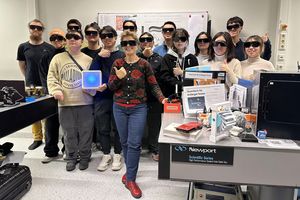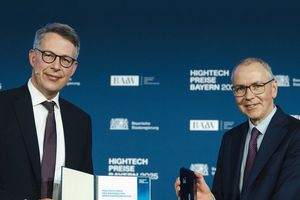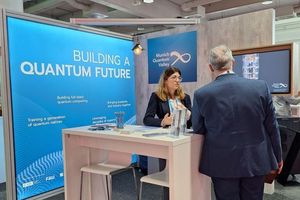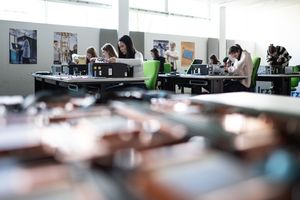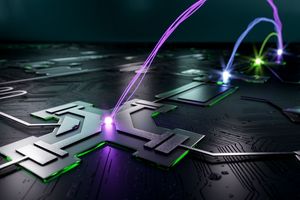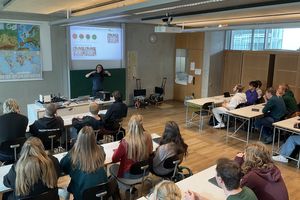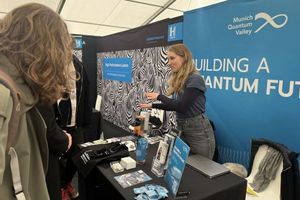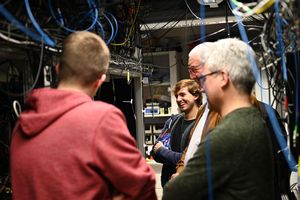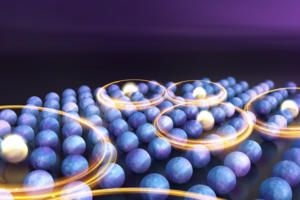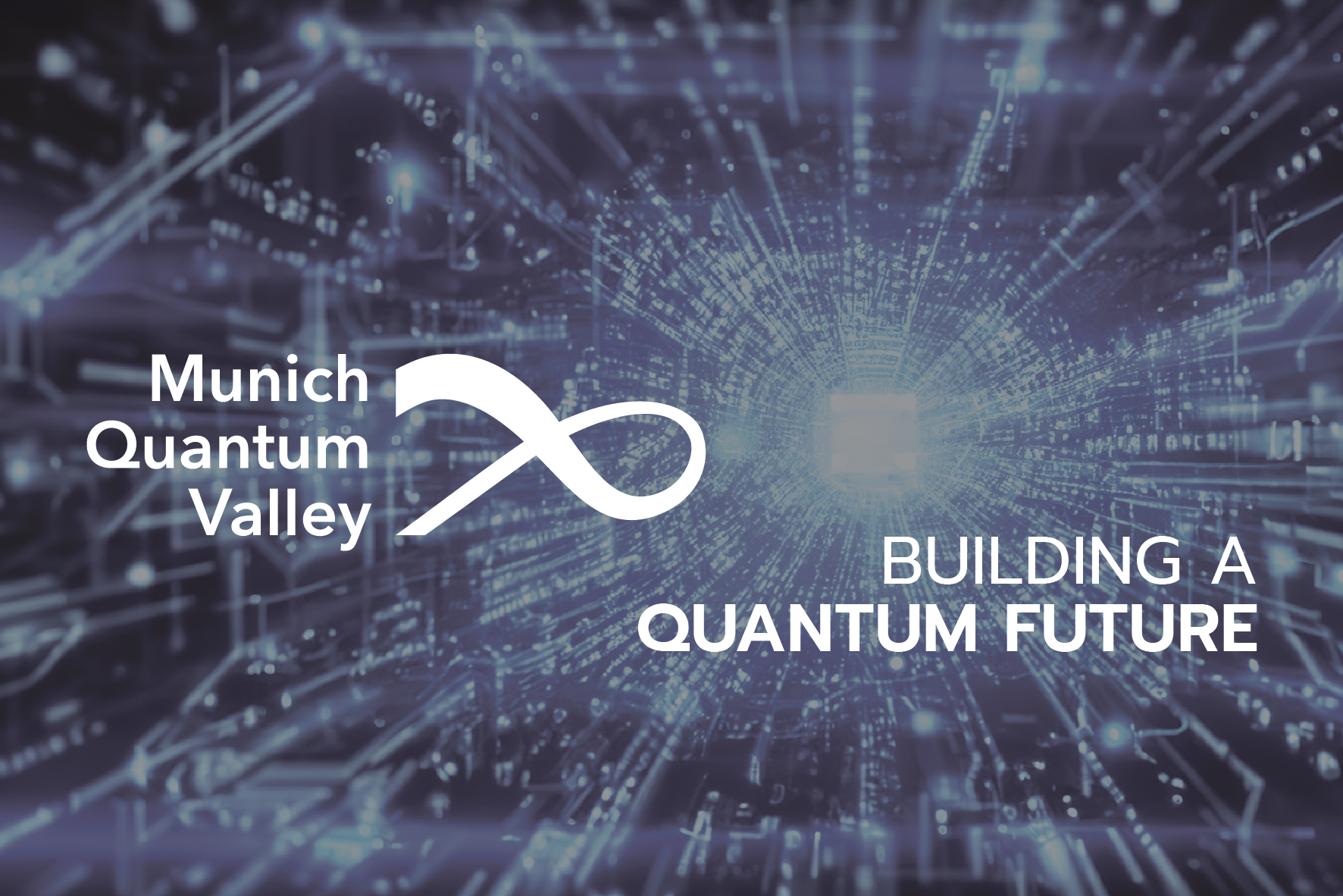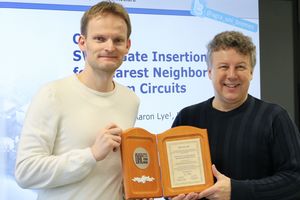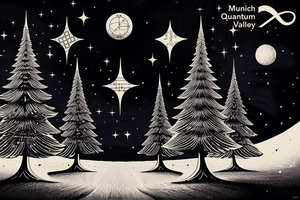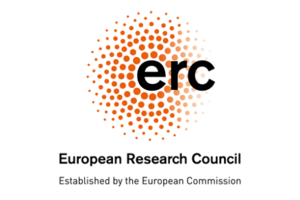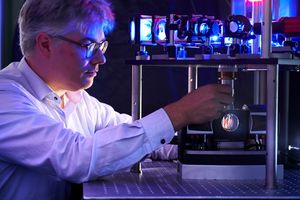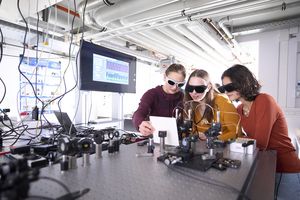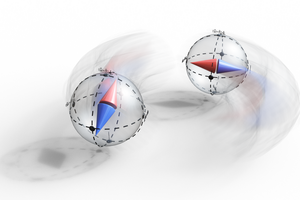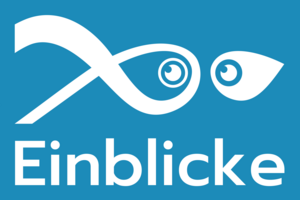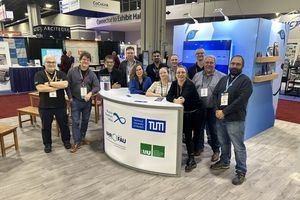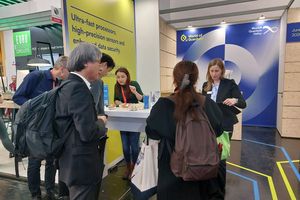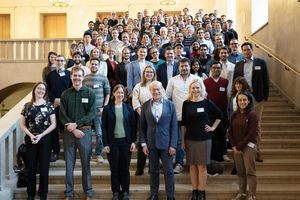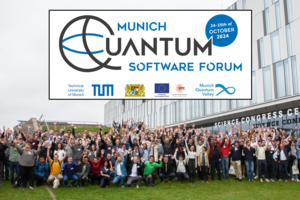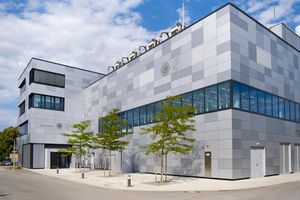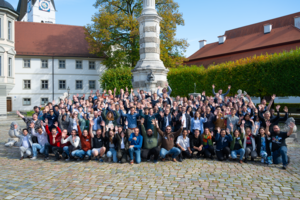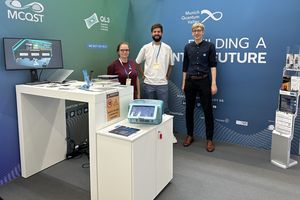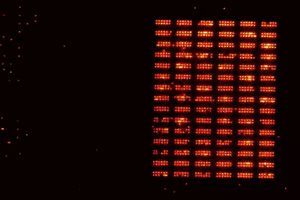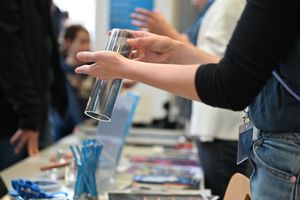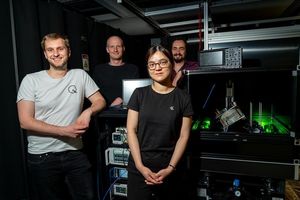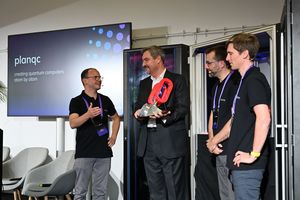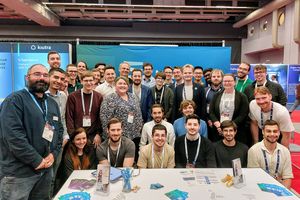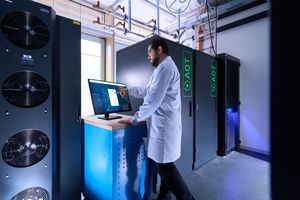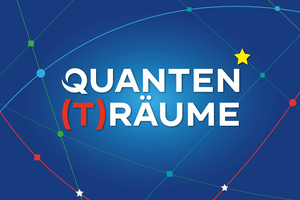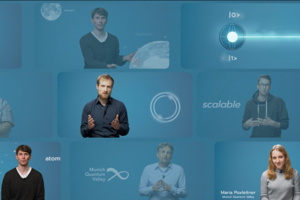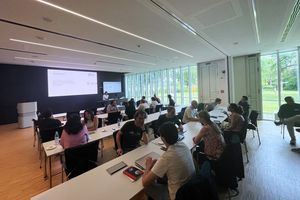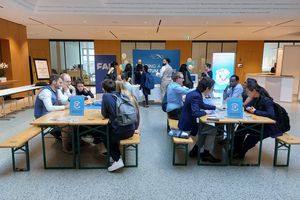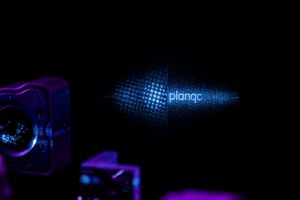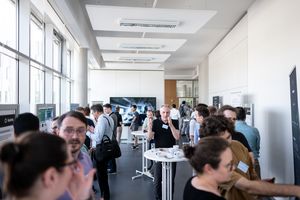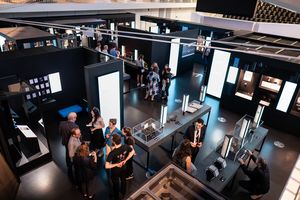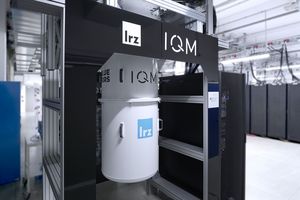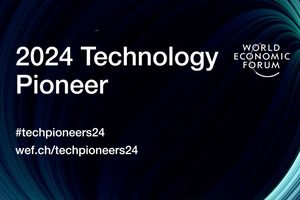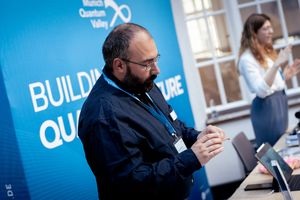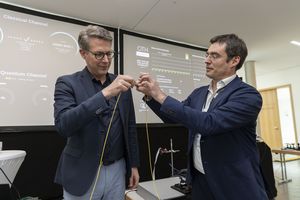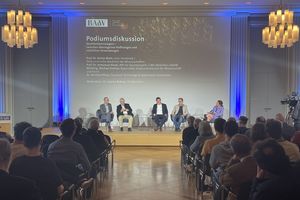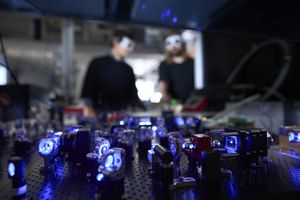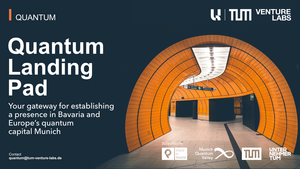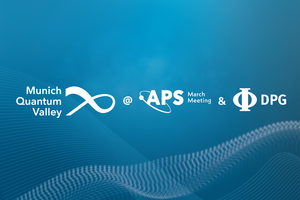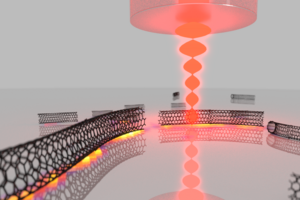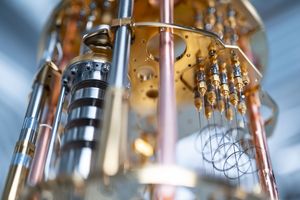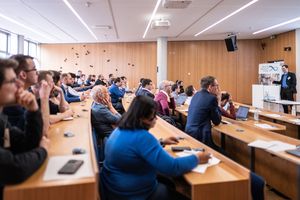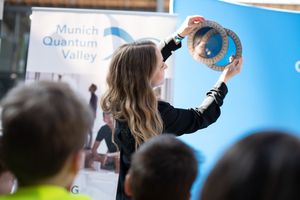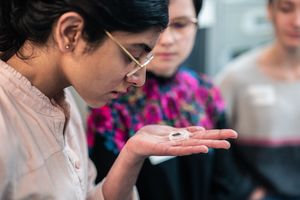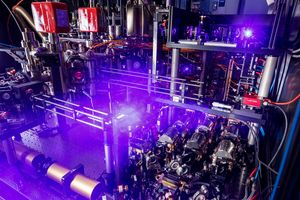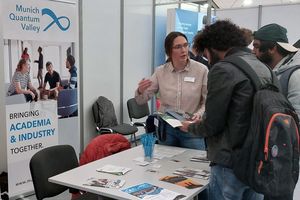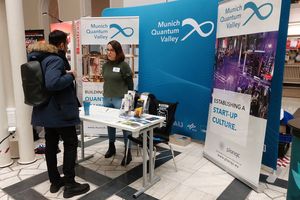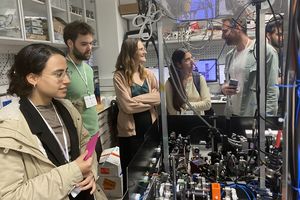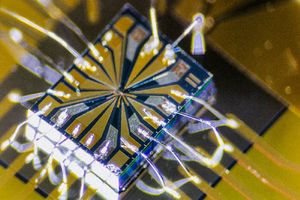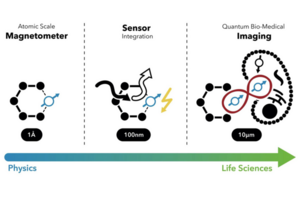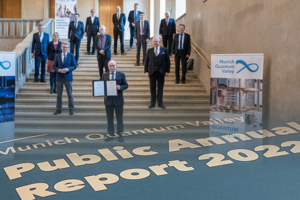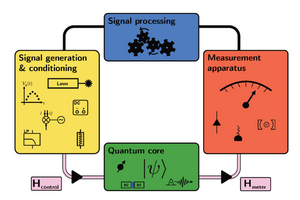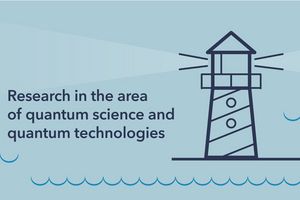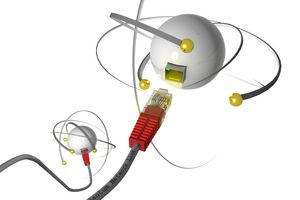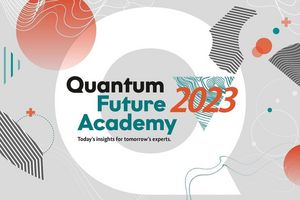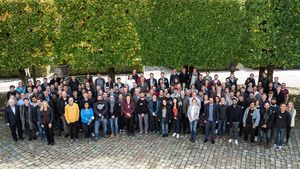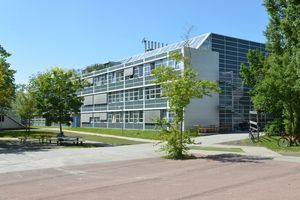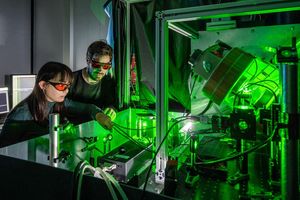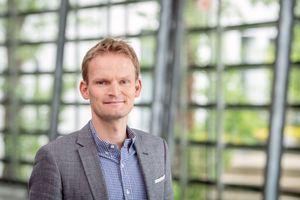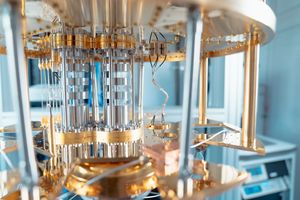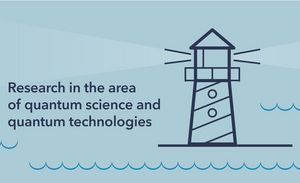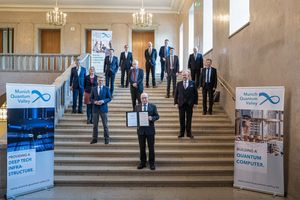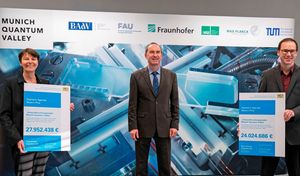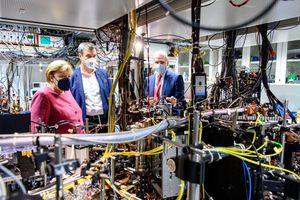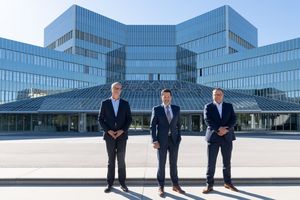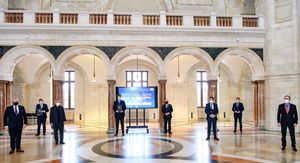
News
Immanuel Bloch becomes member of US National Academy of Sciences
MQV member Immanuel Bloch, a pioneer in quantum research, has been admitted to the American National Academy of Sciences as an international member.
“MQV-Einblicke”: Exploring the world of superconducting quantum computers
On 29 April, the two FAU researchers Florian Marquardt and Christopher Eichler gave two lectures as part of the event series "MQV-Einblicke – 100 Jahre Quantenwissenschaften und woran wir heute forschen" to give the numerous visitors exciting insights into the world of quantum computing. Those who managed to get a place on the lab tour then had the opportunity to learn more about the development, fabrication and operation of superconducting quantum chips.
PhotonLab international – school lab inspires visitors from all over the world
Enthusiasm for quantum physics unites across national borders! PhotonLab, the student laboratory at the Max Planck Institute of Quantum Optics (MPQ), in which Munich Quantum Valley (MQV) is also involved, therefore also offers its exciting experiments program to international visitors from all over the world. An overview on the occasion of today's World Quantum Day.
Hightech Prize for quantum physicist Immanuel Bloch
MQV member Immanuel Bloch has been awarded the first-ever High-Tech Prize of the Bavarian Minister President. On Wednesday, State Minister Markus Blume presented the prize at the Munich Residence.
Munich Quantum Valley at the Hannover Messe 2025
As in the last two years, Munich Quantum Valley (MQV) was an exhibitor at the Hannover Messe. From March 31 to April 4, visitors to the stand were given the opportunity to find out more about quantum research in Bavaria.
Exploring supercomputers and quantum computers: MQV Girls'Day at the Leibniz Supercomputing Centre
What is it like to work as a computer scientist, physicist or mathematician in a computer center and to research supercomputers and quantum computers? On 3 April 2025, eight students aged 14 to 17 took the opportunity on Girls'Day to gain an insight into this career field and took part in the Munich Quantum Valley program, which this year took place in cooperation with and at the Leibniz Supercomputing Centre.
MQV researchers demonstrate efficient multi-qubit entanglement
A research team from Munich Quantum Valley (MQV) at the Walther Meißner Institute (WMI), has implemented Perfect State Transfer on a chain of six superconducting qubits and demonstrated its usefulness in efficiently connecting distant qubits and generating multi-qubit entanglement.
Interactive Mebis course on quantum physics for Bavarian schools
Munich Quantum Valley (MQV), in collaboration with the PhotonLab student laboratory at the Max Planck Institute for Quantum Optics (MPQ), has developed an innovative learning resource for the classroom. The interactive qubit- and quantum books are now available to all Bavarian teachers as an Mebis-TeachShare course. These courses facilitate the integration of quantum physics and quantum technologies into the classroom and cover key content in the bavarian curriculum.
MQV at the DPG spring conferences 2025
This year, Munich Quantum Valley (MQV) was once again represented with booths at the spring conferences of the German Physical Society (DPG) of the sections Atoms, Molecules, Quantum Optics and Photonics (SAMOP) and Condensed Matter (SKM).
"MQV-Einblicke": Looking inside a quantum optics laboratory
This week, the first regular event in the series “MQV Einblicke – 100 Jahre Quantenwissenschaften und woran wir heute forschen” took place at the Max Planck Institute of Quantum Optics (MPQ). During an introductory lecture and subsequent tour of the quantum optical laboratories at MPQ, the extremely interested audience gained insights into quantum simulation and quantum computing with neutral atoms.
Arnold Sommerfeld School on "Quantum Computing – Status and Prospects"
MQV members are co-organizing this year's summer school on on "Quantum Computing – Status and Prospects" of the Arnold Sommerfeld Center for Theoretical Physics at LMU Munich, 6–10 October 2025.
"100 Jahre Quantenphysik – und das ist erst der Anfang": Successful start to the "MQV-Einblicke" event series
On Wednesday, Prof Rainer Blatt opened the series of events "MQV Einblicke – 100 Jahre Quantenwissenschaften und woran wir heute forschen" in the International Year of Quantum Science and Technology 2025 with his lecture "100 Jahre Quantenphysik – und das ist erst der Anfang" in the packed plenary hall of the Bavarian Academy of Sciences and Humanities.
Bavarian state government sets the course for the further development of Munich Quantum Valley
At its cabinet meeting on 11 February, the Bavarian state government reaffirmed its commitment to Munich Quantum Valley (MQV), thereby setting a bold course for its continued expansion. This decision paves the way for MQV’s overarching mission: to develop and operate cutting-edge quantum computers for real-world applications, in close collaboration with visionary start-ups and leading industrial partners.
Developed 10 years ago, in use today: Software for quantum computers receives award
Quantum computers are increasingly becoming a reality. However, special software is required to ensure that they can be used smoothly. The basis of such software, developed 10 years ago, has now been honoured with a ‘10-year Retrospective Most Influential Paper Award’.
Munich Quantum Valley end-of-year greetings
As the year comes to an end, we want to express our heartfelt gratitude for your support and dedication throughout the past year. We wish you a holiday season filled with joy and tranquility, and we eagerly anticipate a new year that brings happiness and achievements, both great and small.
ERC Consolidator Grants for Michael Knap and Andreas Reiserer
MQV members Michael Knap and Andreas Reiserer, both professors at the Technical University of Munich (TUM), have been awarded the prestigious Consolidator Grants of the European Research Council (ERC).
Hans Hübl appointed Adjunct Professor at TUM
The Technical University of Munich (TUM) has appointed MQV member Dr. habil. Hans Hübl as Adjunct Professor in recognition of his outstanding achievements in research and teaching in the field of quantum science and technology.
22,222 visitors to the PhotonLab
For 13 years, the PhotonLab, the student laboratory at the Max Planck Institute of Quantum Optics, has been welcoming everyone who wants to learn about lasers, light and quantum physics. As of this Friday, a total of 22,222 students have visited the PhotonLab to experiment together.
ERC Consolidator Grant for Matthias Althammer
Matthias Althammer, research group leader at the Walther Meissner Institute (WMI) of the Bavarian Academy of Sciences and Humanities (BAdW) has been awarded one of the highly prestigious Consolidator Grants of the European Research Council (ERC). The research grant will fund a project that conducts MQV-related research.
Event series "MQV-Einblicke – 100 Jahre Quantenwissenschaften und woran wir heute forschen"
Experience cutting-edge research in quantum technology! In the International Year of Quantum Science and Technology 2025, the member institutes of Munich Quantum Valley open their doors and provide insights into their research through lectures and laboratory tours.
MQV at the SC24
From 17 to 22 November, Munich Quantum Valley (MQV) was present at the International Conference for High Performance Computing, Networking, Storage, and Analysis (SC24) in Atlanta, Georgia.
MQV at the electronica 2024
From 12 to 15 November 2024, Munich Quantum Valley (MQV) took part in electronica with a joint booth with the “World of Quantum”. With 3,480 exhibitors spread across 18 exhibition halls and around 80,000 visitors this year, electronica is the leading trade fair and conference for the entire spectrum of electronics.
Symposium "Towards applications of quantum computing": networking science and industry
On 11 and 12 November, the symposium "Towards applications of quantum computing" took place. The event was organized by Munich Quantum Valley (MQV) together with the Fraunhofer Institute for Cognitive Systems IKS, supported by Bayern Innovativ and QUTAC. The symposium brought together representatives from industry and science working on quantum computing applications with hardware and software developers.
Munich Quantum Software Forum 2024
On 24 and 25 October 2024, the Munich Quantum Software Forum took place for the second time. Organized by the Chair of Design Automation at the Technical University of Munich, the event brings together the "who's who" of quantum computing software. Once again, the extremely high attendance shows the great interest of the community.
Max Planck Semiconductor Laboratory opens new building in Garching
On 7 October, a new building of the Max Planck Society's Semiconductor Laboratory (HLL) was opened on the Garching research campus. The state-of-the-art infrastructure plays a central role in the new cooperation between the HLL, the Technical University of Munich and the Walther Meißner Institute for the joint development of superconducting quantum bits, which was agreed as part of Munich Quantum Valley.
MQV Annual Meeting 2024
From 8 to 11 October 2024, the members of Munich Quantum Valley (MQV) met in Eichstätt for their internal Annual Meeting. In numerous presentations and discussions, the progress of the individual sub-projects and their contribution to the overall project were intensively debated and the focus was sharpened on the future.
Munich Quantum Valley at Quantum Effects
Once again, Munich Quantum Valley was present at the Quantum Effects trade fair in Stuttgart.
MQV researchers continously operate quantum register with 1200 atoms for the first time
A research team from Munich Quantum Valley (MQV) at the Max Planck Institute of Quantum Optics (MPQ), in collaboration with the start-up planqc, has achieved a breakthrough on the way to scalable quantum computers. They assembled a quantum register of 1200 atoms and were then able to operate it continuously for over an hour.
Exploring quantum science – MQV at the Open Day in Garching
On 3 October, Munich Quantum Valley, in collaboration with the Leibniz Supercomputing Centre, took part in the campus-wide Open Day at the Garching research campus. The flow of visitors continued until the end of the event.
Quantum sensor technology for cancer monitoring wins Medical Valley Award
As part of the 'Munich Quantum Valley' Lighthouse Project IQ-Sense, researchers at the Technical University of Munich have developed a new method for the optical detection of MRI signals using diamond-based quantum sensors. In collaboration with the Hospital of the Ludwig-Maximilians-Universität München, the researchers now want to make their method applicable for clinical use in the field of cancer monitoring, for which they have received the Medical Valley Award.
Quantum Diamonds presents new device for optimizing chip production
Last week, Quantum Diamonds hosted the official launch of its new device. The start-up from the Munich Quantum Valley ecosystem presented its new, high-resolution quantum microscope to an invited audience of investors and supporters from industry and academia at its facilities in Werk 1 of Munich's Werksviertel.
Planqc opens its new headquarters in Garching
Yesterday, planqc opened its new premises in Garching. Together with representatives from politics and industry as well as investors, the start-up, which is the first start-up to emerge from Munich Quantum Valley (MQV), celebrated this important step.
Munich Quantum Valley at the IEEE Quantum Week 2024
From 15 to 20 September 2024, the IEEE International Conference on Quantum Computing and Engineering (QCE) took place in Montreal. This year, Munich Quantum Valley (MQV) was represented with a stand in addition to numerous contributions.
Ion-trap quantum computer ready for novel research and development at the LRZ
The ion-trap quantum computer from Alpine Quantum Technologies, procured by the Leibniz Supercomputing Centre and Munich Quantum Valley, is now operational at LRZ's Quantum Integration Centre, making it the first of its kind in a computing center.
Quantum dreams and spaces for the future
MQV is a partner in the joint project Quanten(t)räume – a play of German word quantum spaces and quatum dreams – funded by the Federal Ministry of Education and Research (BMBF). Starting next Tuesday, the project will offer regular opportunities to find out about the state of research in the field of quantum technologies, ask questions to the experts and contribute your own ideas for useful applications.
Quick Quantum Questions: New video series on the MQV YouTube channel
Today sees the launch of the new video series "Quick Quantum Questions" on the Munich Quantum Valley (MQV) YouTube channel.
Munich Quantum Alumni Meet-Up: Summer Networking at MPQ
The first meeting of the Munich Quantum Alumni Network took place last week. In a casual atmosphere, current and former members of the scientific community were invited to exchange ideas and network.
MQV at the Bavarian Evening of the 73rd Lindau Nobel Laureate Meeting
On 4 July 2024, the traditional Bavarian Evening took place as part of the 73rd Lindau Nobel Laureate Meeting. This year, the conference focused on quantum physics and quantum technologies. Munich Quantum Valley contributed to the program of the Bavarian Evening with a booth and QuantenSchafkopf.
planqc secures €50 million in Series-A funding
MQV start-up planqc has just announced the successful closing of its first significant round of venture capital funding.
A whole weekend full of quantum: MQV at FORSCHA and the Island Festival
As in previous years, Munich Quantum Valley (MQV) was present at the FORSCHA trade fair from 28 to 30 June, which took place as part of the Munich Science Days in the Verkehrszentrum of the Deutsches Museum. At the same time, the Deutsches Museum celebrated the Island Festival over the weekend. The MQV was also on site with experiments and exhibits.
Connecting industry and academia: Looking back at the MQV Supplier Workshop
Yesterday, Munich Quantum Valley (MQV) invited industry partners and researchers to the first "MQV Supplier Workshop" in Garching. The event aimed to constructively connect representatives from industry and academia within the MQV ecosystem and strengthen the quantum community.
Special exhibition "Light and Matter" opens at the Deutsches Museum
On 18 June 2024, the special exhibition "Light and Matter", which was developed in cooperation with the Munich Center for Quantum Science and Technology (MCQST), opened at the Deutsches Museum. Scheduled to run until the end of 2025, visitors to the exhibition can learn about the basics of quantum optics starting today.
Leibniz Supercomputing Centre hosts Germany's first hybrid quantum computer
At the Leibniz Supercomputing Centre, a quantum computer based on superconducting qubits has been successfully connected to the SuperMUC-NG supercomputer. Initial tests show that the two technologies work together, enabling hybrid quantum computing. Today, the system has been formally unveiled.
planqc selected to join World Economic Forum as Technology Pioneer 2024
As announced today, the MQV start-up has been selected to join the World Economic Forum’s Innovator Communities in the Technology Pioneers 2024 Cohort.
Munich Quantum Valley at the Bavarian State Representation in Berlin
Under the motto "Impulses from Bavaria", the Bavarian State Ministry of Science and the Arts invited guests to the Bavarian State Representation in Berlin to present the Hightech Agenda Bavaria. Munich Quantum Valley supported the evening with a booth.
Ceremonial inauguration of the quantum key exchange system at OTH Regensburg
The Ostbayerische Technische Hochschule (OTH) Regensburg is one of the first universities in Germany to receive a quantum key exchange system. The system, which was acquired as part of a Munich Quantum Valley (MQV) research professorship, was officially inaugurated this Wednesday by Markus Blume, Minister of State for Science and the Arts.
Open Day of the Bavarian Academy of Sciences and Humanities
Last Saturday, Munich Quantum Valley took part in the Open Day of the Bavarian Academy of Sciences and Humanities, informing the numerous visitors about the basics of quantum physics and research into quantum computers.
A day as a microtechnologist: MQV Girls'Day at the Fraunhofer EMFT
15 students aged 14 and 15 took part in the Girls'Day program of Munich Quantum Valley (MQV), which was held this year in collaboration with and at the Fraunhofer Institute for Electronic Microsystems and Solid State Technologies (EMFT).
Quantum Symposium of the Bavarian Academy of Sciences and Humanities
Last week, the Bavarian Academy of Sciences and Humanities (BAdW) hosted a symposium on the topic of "Quantum technologies. Expectations of an important future technology" at its premises in the Munich Residence. Munich Quantum Valley (MQV) was one of the co-organizers.
Compiler for neutral-atom quantum computers: Computer scientists and physicists from MQV collaborate on basic principles
In close collaboration between computer scientists and physicists, MQV scientists have worked out foundations for the comprehensive development of compilers for neutral-atom quantum computers. The aim of the researchers is to create a common basis and further expand interdisciplinary collaboration.
Quantum Landing Pad launched to help international quantum start-ups establish themselves in Munich/Bavaria
In an exciting development for the quantum technology sector in Munich and Bavaria, Munich Quantum Valley, Invest in Bavaria and TUM Venture Lab Quantum jointly launch the Quantum Landing Pad.
Munich Quantum Valley at the March Conferences 2024
At no less than three conferences in three weeks, Munich Quantum Valley welcomed interested visitors to its booths this March. At the March Meeting of the American Physical Society (APS) in Minneapolis and at the Spring Meetings of the German Physical Society (DPG) in Freiburg and Berlin, MQV was presenting Bavarian quantum research.
Quantum-optics start-up Qlibri selected for prestigious European Innovation Council Transition grant
Earlier this month, the European Innovation Council (EIC) announced that Qlibri's QlibriNANO, the world's most sensitive absorption microscope, is among the projects selected to receive a grant of up to €2.5 million.
Quantum Talents Symposium in Munich
Munich Quantum Valley (MQV), together with other local partners, is supporting the Munich Center for Quantum Science and Technology (MCQST) in organizing the "Quantum Talents Symposium" on 16 and 17 September 2024 in Munich. Young talents from the quantum sciences are invited to apply as symposium finalists.
Expectations of an important future technology: Symposium on quantum technologies in Munich
With the support of Munich Quantum Valley, the Bavarian Academy of Sciences and Humanities (BAdW) is organizing the symposium "Quantum Technologies. Expectations of an important future technology" with top-class lectures.
MQV as a central building block in Bavaria's future strategy
At this week's meeting of the Bavarian Cabinet on science and future technologies, Munich Quantum Valley (MQV) was highlighted as one of the central pillars of Bavaria's strategy for the future.
Munich Quantum Valley at the Spring Meetings 2024
This year, Munich Quantum Valley (MQV) will once again be exhibiting at the March Meeting of the American Physical Society (APS) in Minneapolis and at the Spring Meetings of the German Physical Society (DPG) in Freiburg and Berlin.
New project: Quantum Physics for All!
GALaQSci uses augmented reality and artificial intelligence to make the quantum world accessible in a playful way.
A trapped-ion quantum computer for Munich Quantum Valley
In cooperation with Munich Quantum Valley, the Leibniz Supercomputing Centre is procuring a quantum computer based on trapped-ion technology.
Quantum-sensing start-up QuantumDiamonds secures 7 million euros in seed capital
Earlier this week, MQV ecosystem start-up QuantumDiamonds announced a very successful 7 million euro seed funding round led by IQ Capital and Earlybird.
Munich Quantum Valley at Quantum Effects and EQTC
The trade fair season is slowly coming to an end, but also in October Munich Quantum Valley was present at two events in Germany.
MQV joins the Open Day in Garching
On 3 October 2023, the Max Planck Institute of Quantum Optics, together with Munich Quantum Valley and the Munich Center for Quantum Science and Technology, invited children and adults alike to take a look behind the doors of the institute and learn about the world of quantum optics and its technological applications, such as quantum computing.
MQV Review Meeting 2023
From 26 to 28 September 2023, Munich Quantum Valley met in Eichstätt to discuss the progress of the various individual sub-projects over the past year and to identify new synergies and goals for the next years.
Open Doors with the Munich Quantum Valley at the Max Planck Institute of Quantum Optics
Opening the doors for young and old is the motto on 3 October 2023 at the Garching research campus. The Munich Quantum Valley (MQV), the Munich Center for Quantum Science and Technology (MCQST) and the Max Planck Institute for Quantum Optics (MPQ) jointly invite to get to know the world of quantum (optics) with a colorful program.
Successful closure of the Quantum Future Academy 2023 in Munich and Berlin
The Quantum Future Academy (QFA) brings together young talents in the field of quantum technologies. The first part of the binational event took place in Israel in February. The second week-long academy in Germany concluded this year's program this past week.
Superconducting Qubits and Algorithms Conference 2023 in Munich
Around 400 people from all over the world participated in the second edition of the Superconducting Qubits and Algorithms (SQA) Conference taking place 29 August - 1 September 2023. The conference was jointly organized by IQM Quantum Computers, Technical University of Munich and Munich Quantum Valley.
Rudolf Gross becomes new Scientific Director of Munich Quantum Valley
On 1 August 2023, Prof. Dr. Rudolf Gross becomes Scientific Director of Munich Quantum Valley (MQV) and Managing Director of Munich Quantum Valley e.V.. The physicist will take over the tasks from Prof. Dr. Rainer Blatt, who hands over the baton to Rudolf Gross after about two years.
Applications of Quantum Computing Symposium: Potentials and Expectations
Together with the Fraunhofer Institute for Cognitive Systems (IKS), Munich Quantum Valley organized the symposium "Applications of Quantum Computing" in Garching on 10 and 11 July. Experts from industry and academic research were invited to discuss possible applications of quantum computing.
The future of quantum technologies: MQV at the Festival of the Future 2023
From July 6 to 8, Munich Quantum Valley was part of the Festival of the Future on the Museum Island in Munich. At the booth, on panels and in workshops, MQV together with MCQST, PhotonLab and QL3 informed the diverse audience about quantum technologies.
World of Quantum 2023: Large crowds and a full program
From 27 to 30 June, the World of QUANTUM, took place at the Munich Trade Fair Center. Munich Quantum Valley (MQV) was present with a booth and organized a full-day scientific program together with IBM Quantum.
Minister of State Blume visits
The Bavarian Minister of State for Science & the Arts Markus Blume visits the MPQ & LMU laboratories of the MQV to find out about the progress of the projects and to discuss technology transfer and research strategies with the researchers.
Lighthouse project Bench-QC: Searching for the quantum advantage in industrial applications
The Bench-QC lighthouse project aims to find out when quantum computers deliver better results than classical high-performance computers. The joint project is funded through the Hightech Agenda by the Free State of Bavaria until the end of 2025 as part of the Munich Quantum Valley (MQV).
Magnons Prefer a Sense of Rotation Dancing the Waltz
A team of researchers from the Bavarian Academy of Sciences and Humanities (BAdW), the Technical University of Munich (TUM) and the Universidad Autónoma de Madrid (UAM) have demonstrated nonreciprocal behavior of magnons in an insulating antiferromagnet, allowing the development of nonreciprocal magnonic devices.
MQV and IBM Quantum present quantum technologies from research to application at the World of QUANTUM
Munich Quantum Valley (MQV), a leading German quantum hub, and IBM Quantum will host experts from academia and industry to present at their joint World of QUANTUM program: "Quantum Technologies: From Research to Application". The full-day program will take place 29 June 2023 as part of the World of QUANTUM fair in Munich (27–30 June 2023).
Symposium "Applications of Quantum Computing" in Munich
Munich Quantum Valley brings together experts from academic and industrial research to discuss issues related to the potential applications of quantum computing.
A 40-year journey towards understanding the Duffing oscillator
A team of researchers from the Bavarian Academy of Sciences and Humanities (BAdW) and the Technical University of Munich (TUM) have resolved a longstanding discrepancy between the classical and quantum description of the nonlinear Duffing oscillator by studying the quantum dynamics of a model system consisting of a tunable nonlinear superconducting resonator.
Quantum Computing meets Cyber Security: Lively Exchange at Symposium in Garching
On Friday, 12 May, the symposium "Quantum Computing meets Cyber Security" took place in Garching. Munich Quantum Valley together with the University of the Bundeswehr Munich (UniBW) and the Ludwig-Maximilians-Universität München (LMU) invited experts to discuss cyber risks in the age of quantum computers.
Amazing Experiments and the Fascination of Quantum Computing: MQV at FORSCHA 2023
From 5 to 7 May, Munich Quantum Valley was part of the FORSCHA, which took place as part of the Munich Science Days at the Deutsches Museum Verkehrszentrum. Around 8,000 visitors attended the interactive festival of knowledge.
Smoking heads, cool experiments: the MQV Girls'Day
Ten female students aged 14 to 16 took part in Munich Quantum Valley's Girls'Day event. At the Walther Meissner Institute of the Bavarian Academy of Sciences and Humanities, they were able to learn about the profession of (quantum) scientist through a diverse program.
MQV start-up planqc awarded with DLR Quantum Computing Initiative contract
As announced by the German Aerospace Center (DLR) today, planqc will develop a quantum computer with more than 100 qubits using neutral atoms at the DLR Innovation Center in Ulm as part of the DLR Quantum Computing Initiative (QCI).
Immanuel Bloch honoured with “ZEISS Research Award”
The MQV member and director of the Max Planck Institute of Quantum Optics (MPQ) receives the award for his groundbreaking experimental research on quantum simulations with ultracold atoms.
Munich Quantum Valley at the DPG Spring Meeting of the Condensed Matter Section
Munich Quantum Valley was represented with a booth at the DPG Spring Meeting of the Condensed Matter Section (SKM) as part of the Exhibition of Scientific Instruments and Literature from March 28 to 30.
Presenting bavarian quantum research at home and abroad: Munich Quantum Valley at the DPG and APS conferences
Munich Quantum Valley took part in two conferences in the first week of March: At the DPG Spring Meeting of the Atomic, Molecular, Quantum Optics and Photonics Section (SAMOP) in Hannover as well as at the March Meeting of the American Physical Society (APS March Meeting) in Las Vegas, MQV presented itself with a booth.
Quantum Computing meets Cyber Security: Symposium in Munich brings experts together
Quantum computers could solve problems beyond the capabilities of current classical computers. In parallel, powerful quantum technologies pose a new threat to security systems. The symposium Quantum Computing meets Cyber Security brings together experts to discuss cyber security issues.
Quantum computing in practice
Listen to a podcast [in German] with our Scientific Director Rainer Blatt about quantum computing in practice.
Quantum Future Academy 2023: Young researchers visit Israel
The Quantum Future Academy (QFA) is a bi-national event that brings together students from Israel and Germany in two week-long academies on quantum technologies. The first part of the program in Israel takes place this week.
Lighthouse project "Quantum circuits with spin qubits and hybrid Josephson junctions" explores the core of possible future quantum computers
Four research groups of the University of Regensburg (UR) started their work in the lighthouse project "Quantum circuits with spin qubits and hybrid Josephson junctions" at the beginning of the year. Within the project, which is funded by the Free State of Bavaria as part of the Munich Quantum Valley (MQV), they are investigating central components of possible future quantum computers based on semiconductor spin qubits and superconducting qubits.
Integrated quantum sensors for imaging and tissue analysis - Lighthouse Project IQ-Sense starts
The lighthouse project IQ-Sense began its work at the beginning of the year. As one of currently seven projects, it is funded by the Free State of Bavaria within the framework of Munich Quantum Valley (MQV) and aims to develop quantum sensors for application in biology and medicine.
Looking back at the first year
Today we celebrate the first anniversary of the foundation of the Munich Quantum Valley e.V. and look back on a successful year together with the Scientific Director of MQV, Prof. Rainer Blatt.
On this occasion, we are also releasing our first public annual report.
Lighthouse Project QuMeCo – research at the interface between physics and electrical engineering
Funded by the Free State of Bavaria as part of Munich Quantum Valley (MQV), QuMeCo is set to explore new and better measurement and control methods for quantum systems and took up its work at Friedrich-Alexander-Universität Erlangen-Nürnberg (FAU) beginning of January.
Call for company-driven Lighthouse Projects for applications in the field of quantum technologies
As part of the Bavarian State Government's Hightech Agenda Plus, the Bavarian State Ministry of Economic Affairs, Regional Development and Energy (StMWi) supports innovative, company-driven collaborative projects within MQV.
Lighthouse project "Networked Quantum Systems" (NeQuS) takes up work
The joint project, which is funded by the Free State of Bavaria as part of Munich Quantum Valley (MQV), will start on 1 January 2023. Scientists from five MQV institutes will work on networks of different quantum systems.
Apply for the Munich Quantum Valley doctoral fellowship program
The Munich Quantum Valley Doctoral Fellowship Program is now open for a start in 2023. The program aims to recruit exceptional students to support them in their early-career progress. The call for applications just started and is open until 15 January 2023.
Applications open for the 2023 Quantum Future Academy
The 2023 Quantum Future Academy will be held as a bi-national event! For the first time, students from Israel and Germany will be attending two one-week academies about quantum technologies. The first part will take place in Israel, 19–26 February 2023, while the second part will be in Germany, 3–10 September 2023.
Bringing the collaboration together in Eichstätt
Last week, the Munich Quantum Valley community came together at the Stadttheater Eichstätt for its first internal Review Meeting. A fantastic opportunity to get together scientists and members from all research areas within MQV.
Leibniz Supercomputing Centre becomes German host for one of the six first European Quantum Computers
Earlier this week, the European High Performance Computing Joint Undertaking (EuroHPC JU) announced that the Leibniz Supercomputing Centre (LRZ) will be one of six sites to host the first European quantum computers.
About 1.2 million euros for doctoral scholarships
As part of the Munich Quantum Valley (MQV) initiative, the Free State of Bavaria is supporting six outstanding doctoral students in their research in the field of quantum sciences with doctoral scholarships of around 200,000 euros each. The internationally selected top talents will conduct research at the Friedrich Alexander University Erlangen-Nuremberg (FAU), the Ludwig Maximilian University Munich (LMU) and the Technical University of Munich (TUM).
Nearly 17 million euros funding for Lighthouse Projects
With funds from the Hightech Agenda Bavaria, the Free State of Bavaria is supporting five basic-research projects in the field of quantum sciences with a total of about 17 million euros as part of the Munich Quantum Valley initiative. Acknowledging the expertise available at universities and research institutions throughout Bavaria, the interdisciplinary and cross-university Lighthouse Projects promote Bavaria's leading role in the field of quantum technologies.
Max-Planck scientists found planqc to build highly scalable quantum computer
Quantum computing startup planqc today announced a financing round of EUR 4.6 million led by UVC Partners and Speedinvest. With this funding, planqc will develop a highly scalable quantum computer operating at room temperature that is based on atoms trapped in optical lattices. planqc was founded by a team of scientists from the Max-Planck-Institute of Quantum Optics and Ludwig-Maximilians-University Munich and is the first startup to emerge from Munich Quantum Valley, one of the leading quantum technology hubs in Europe.
First Bavarian Distinguished Professorship awarded
The first Bavarian Distinguished Professorship has been awarded to Prof. Dr.-Ing. Robert Wille, who previously taught in Linz and now holds the newly established Chair for Design Automation at the Technical University of Munich (TUM). As part of Bavaria’s Hightech Agenda, the Distinguished Professorship Program is intended to bring standout scientific experts to Bavarian universities. Each appointment made in the program is endowed with as much as five million euros for five years.
Around 20 million euros for new professorships in Bavaria
The universities in Augsburg, Würzburg, Erlangen-Nuremberg and Munich, as well as the technical universities of applied sciences in Regensburg and Nuremberg, will receive around twenty million euros in funding from Bavaria's High-Tech Agenda to enable them to further strengthen their profile in quantum sciences and quantum technologies.
When quantum particles fly like bees
A quantum system consisting of only 51 charged atoms can assume more than two quadrillion different states. Calculating the system's behavior is a piece of cake for a quantum simulator. Yet even with todays supercomputers it is almost impossible to verify the result. Researchers of the Munich Quantum Valley (MQV) initiative and the University of Innsbruck have now shown how these systems can be described using equations from the 18th century.
Mikhail Lukin Explores the “New Frontier of Quantum”
The Munich Center for Quantum Science and Technology (MCQST) is hosting a series of three different talks by Harvard physicist and MCQST Distinguished Lecturer Mikhail Lukin in Munich in May.
Fit for quantum: Around one million euros for teaching in quantum technology
Making young scientists fit for quantum technologies: The universities in Augsburg, Bayreuth, Erlangen-Nuremberg, Munich, Regensburg, and Würzburg will each receive around 144,000 euros in funding from the High-Tech Agenda Bavaria.
Call for Lighthouse Projects
The call for Lighthouse Projects for research, development and applications in the area of quantum sciences and quantum technologies is now open. The Bavarian State Ministry of Economic Affairs, Regional Development and Energy and the Bavarian State Ministry of Science and Arts funds so-called Lighthouse Projects as a part of the MQV initiative. These projects should use innovative concepts to cover a broad range of quantum sciences and quantum technologies.
Foundation of the Munich Quantum Valley e.V.
Just one year after the Bavarian state government issued its declaration of intent, the founding document was signed ceremonially at the Bavarian Academy of Sciences and Humanities to mark the formal establishment of the Munich Quantum Valley as a registered association. Supplementing the funding of 300 million euros from Bavaria’s Hightech Agenda the initiative’s members have already raised federal funds totaling more than 80 million euros.
Minister Aiwanger hands over funding to FhG and MPG institutes
The Bavarian Minister of Economic Affairs Hubert Aiwanger has handed over funding certificates totaling 52 million euros for the development of a Bavarian quantum computer.
"It’s so great to see the passion, the verve, with which the work is done here“
German Chancellor Angela Merkel and Bavarian Prime Minister Markus Söder are delighted by their impressions into research and networks at MPQ and express their further support.
Quantum research could be the spring of the next big technological revolution and a seed for wealth. A good reason for German Chancellor Angela Merkel and Bavarian Prime Minister Markus Söder to visit the Max-Planck-Institute of Quantum Optics in Garching near Munich, one of the top places in quantum research in the world, to see the current state of science and its prospects for the future. The State of Bavaria has recently funded the new Munich Quantum Valley initiative with 300 million euros, while the German Federal State provides 2 billion for quantum research as part of its economic stimulus package. The MPQ plays a central role in this development due to its world-renowned expertise and excellent international networks.
BMW supports new TUM endowed chair with 5.1 million euros
The BMW Group will support future research on quantum computers at the Technical University of Munich (TUM). The contract establishing the endowed chair for Quantum Algorithms and Applications ("Quantenalgorithmen und -anwendungen") was signed by TUM president Thomas F. Hofmann, BMW AG Board of Management member Frank Weber and BMW AG CIO Alexander Buresch.
Munich Quantum Valley kicks off
Bavaria's leading scientists and universities kick off a new research initiative to promote quantum science and develop new quantum technologies. The Free State of Bavaria is supporting the project with 300 million euros.


